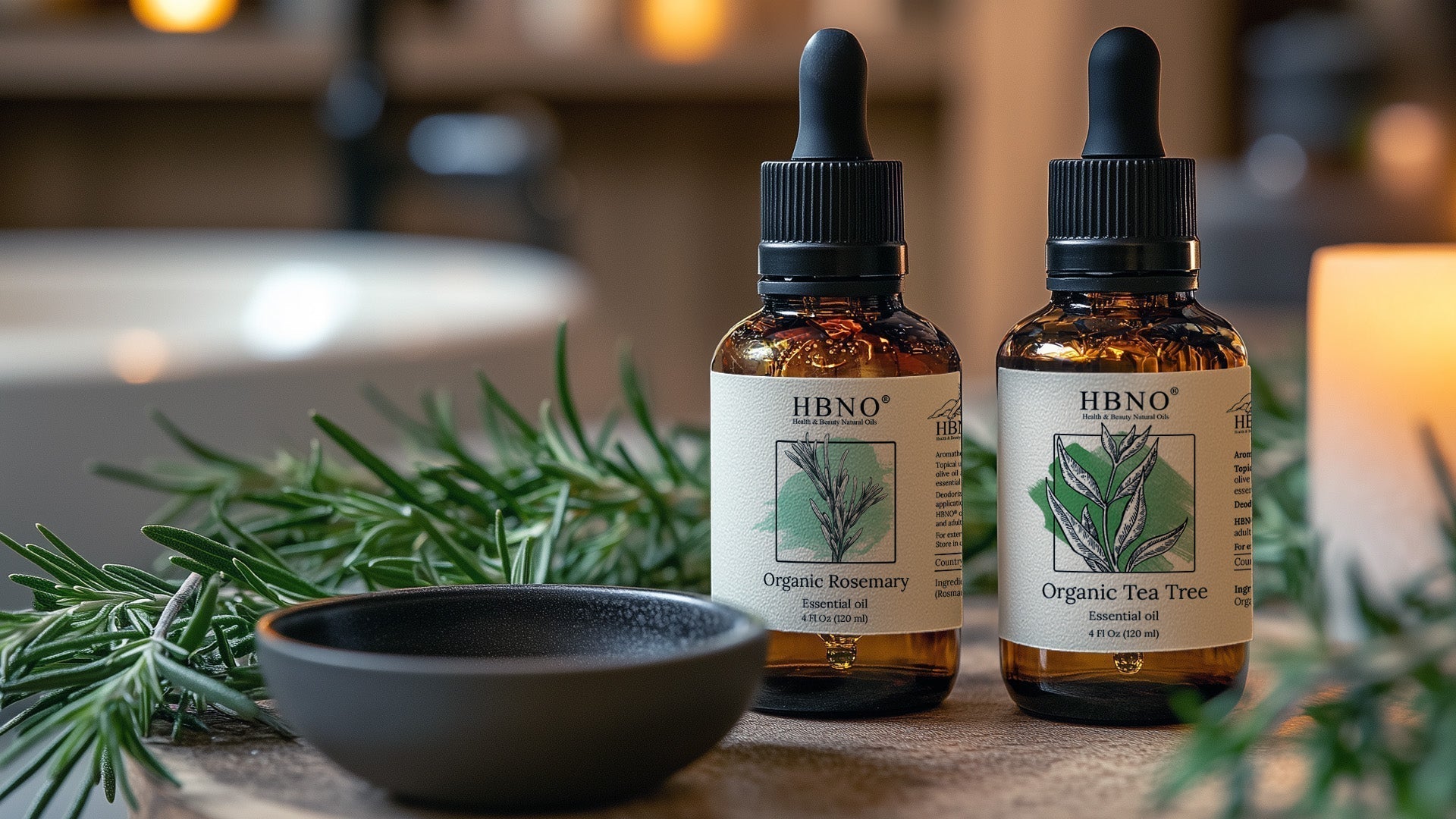
Rosemary and Tea Tree Oil: A Perfect Blend for Hair & Scalp
When it comes to taking care of hair and scalp, a lot of folks are turning to plant-based oils that have been around for ages. Two of them in this realm are organic rosemary essential oil and tea tree oil. These oils have been part of hair care rituals in different cultures for quite some time.
Nowadays, while many people chat about these oils focusing on their lovely scents and self-care vibes, a lot may be drawn to them for their potential benefits for hair and scalp. So, what's the deal with rosemary oil and tea tree oil? This article breaks it down.

Rosemary Oil for Your Hair and Scalp
Rosemary oil comes from Rosmarinus officinalis L plant. Though it may not work the same for all, most people experience a few good results of adding this oil in their hair and scalp care, such as:
1. To Aid Scalp Treatment
Some people use rosemary oil in hair care. They believe it may help keep their scalp clean and refreshed. Many people mix it with a carrier oil and apply it directly to their scalp weekly. The idea is pretty straightforward: keeping the scalp area clear might just lead to better hair texture over time.
2. Great for Reviving Dull Hair
In various communities, rosemary oil is thought to help with hair that looks a bit lifeless or drab. When you mix it into oils or shampoos, some users say it might help coat the hair strands, making them appear shinier and smoother after regular use. Various people often pair it with massaging techniques. Thus, you may also experiment with this oil as a long-standing hair grooming ritual for many.
3. A Favorite Oil for Scalp Massages
Adding a few diluted drops of rosemary oil to your scalp and giving it a good massage has become a part of many people's routines. Results can vary, of course, but some stick with this method in hopes to keep their hair looking and feeling great.
Usually, people leave it on for a bit before rinsing out, and many repeat this process weekly or every other week. You may follow your own routine while using rosemary oil for hair growth.
Tea Tree Oil for Hair and Scalp
Besides rosemary oil, many people also like to explore potential benefits of tea tree oil for their hair and scalp. Various people talk about these potential uses:
1. For a Clean Scalp
Tea tree oil might be known in hair care products like shampoos and scalp treatments. You may often find it in products aimed at keeping your scalp nice and clean. A lot of users feel that it might help remove gunk that may build up from styling products or just daily life. Various people dilute it properly and use it as a pre-wash treatment or toss into cleansing routines.
2. Helpful for Flaky Scalps
Some folks use diluted tea tree oil into their hair care when they notice flakes or if their scalp feels dry. Often they use a mix of peppermint oil and tea tree oil for hair care uses. While everyone's experience is different, many people say that using it consistently, even in small amounts, may help the scalp look clearer over time. It's usually paired with regular washing and brushing for optimal results.
3. Perfect for Minimalist Scalp Care
If you're someone who likes to keep their product lineup simple, tea tree oil might be a great addition to a base oil for weekly scalp care. You may add a few drops mixed into a carrier oil like coconut or jojoba might work wonders.
You may apply it directly to the scalp, let it sit for a bit, and then wash it out. This DIY approach might be a hit among those who love mixing up their own blends at home.

Using Rosemary and Tea Tree Oil Safely
While both of these oils are plant based, they may still cause issues when used carelessly. Here's what most people do to use it safely:
1. Always Dilute Before Use
First things first: both rosemary oil and tea tree oil are pretty potent. You may not want to use them directly on your scalp. It is important to mix them with a carrier oil like argan, olive, or even coconut oil.
A good rule of thumb is about 2 to 3 drops of the essential oil for every tablespoon of the carrier oil. If you skip this step and go straight to the undiluted stuff, you might end up with a dry scalp or some irritation.
2. Perform a Patch Test
Before you go all-in on your scalp, why not do a little test? You may need to dab a small amount on your inner arm or maybe behind your ear. Then, just let it rest for 24 hours and keep an eye out for any irritation. This might be helpful if your scalp is already delicate or if you have any other skin issues.
3. Check Product Ingredients
When you're shopping for shampoos or hair oils that have rosemary or tea tree oil, take a moment to read the label. Some products use extra ingredients that might not work for everyone's hair type. If you're after something simple, look for products that don't have a ton of added fragrances or preservatives.
Conclusion
Rosemary oil and tea tree oil are still popular among folks who want to take a more green approach to their hair and scalp care. Whether you're trying to keep your scalp looking good, manage those pesky flakes, or just want to mix things up in your routine, these oils might be versatile - as long as you use them wisely.
If you want to try these oils and see if they work, HBNO can give you a range of options to choose from. It has a wide collection of premium essential and carrier oils.